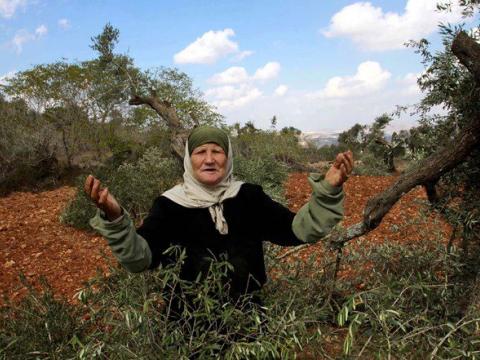Lost olive trees means less income and lost opportunities for families in the West Bank

Late at night on Tuesday, Oct.. 9, 2012 more than 120 olive trees were cut down in the small village of Qaryut in the West Bank city of Southern Nablus.
Olive trees are the main source of income for many Palestinian families and lost trees mean less income and lost opportunities for families in general and affect children in particular.
The Qaryut village is surrounded from all sides by seven Israeli settlements, many of which are less than 200 meters far from Qaryut village homes. The approximately 2,500 inhabitants of the village reportedly suffer from continuous land confiscations, obstruction of movement and Israeli settler violence.
An ongoing and growing problem
The number of Israeli settler attacks has increased in the past year, including incidences such as the recent vandalism of a historic Christian monastery and a historic church Jerusalem. According to the Israeli Information Centre on Human Rights in the Occupied Territories, B'tselem the number of attacks increased from 168 in 2009 to 411 in 2011 in the West Bank (not including East Jerusalem).
Alleged settler attacks continue to be an issue in the West Bank and according to local news sources, Israeli authorities have recently formed a special unit to combat Jewish extremism in the West Bank. The Israeli army is also sending Israel defense forces to olive harvest areas to protect Palestinian farmers from settler aggression.
World Vision in the West Bank
World Vision Jerusalem-West Bank-Gaza (JWG) has been working in the occupied Palestinian territory since 1975. Today, 117 communities are served through programmes, serving nearly 45,000 children.
World Vision JWG has been working in South Nablus, including the village of Qaryut, since October, 2009. World Vision JWG programs benefit more than 18,000 people in South Nablus, through child sponsorship as well as partnerships with 35 community-based organizations, schools and kindergartens.
Caring for children
“This attack is unfortunately one of several that this village and other villages are exposed to on a continuous basis,” explains Naser Maali, World Vision’s Programme manager for the South Nablus area.
“For World Vision, the most vital concern is the well-being of the children in these villages—that they feel safe and are cared for and continue to be protected from such acts of violence,” he adds.
This attacks occurred on the beginning of the olive harvest. There are about 9.5 million olive trees in the West Bank. The trees are one of the main sources of revenue for Palestinian farmers, according to Oxfam, and represent an estimated $100 million of income for Palestinian families.
The importance of olive farming
"Olive farming is a vital source of revenue for me as a farmer, and it helps me improve my bad financial situation,” says Mohammad, a 49-year-old father of four whose 12-year-old son is sponsored by World Vision. “Now I lost around 30 olive trees, which decreases my income."
“More than 120 large olive trees were cut down by settlers on land near the Eli settlement," said Mufeed Abu Murra, a representative of the Qaryut Village Council. "The villagers have been the target of similar attacks from local settlers in the past. They attacked families at home and they scared our children and the worst thing [they did] was stealing the gold and other private properties from one of the houses."
Israel’s military occupation is recognized as being illegal based on international humanitarian law and is one major contributing factor to the current conflict. World Vision supports the position taken by the United Nations that Israeli settlements are illegal under international law. World Vision believes that all children – both Palestinian and Israeli – have the right to live and grow-up in safety, free from violence and fear and that both Palestinian and Israeli children suffer because of violence or the threat of violence.
As an child-focused organization, World Vision continues to work towards ensuring that all children are cared for, protected and participating and have access to the opportunity to have fullness of life.